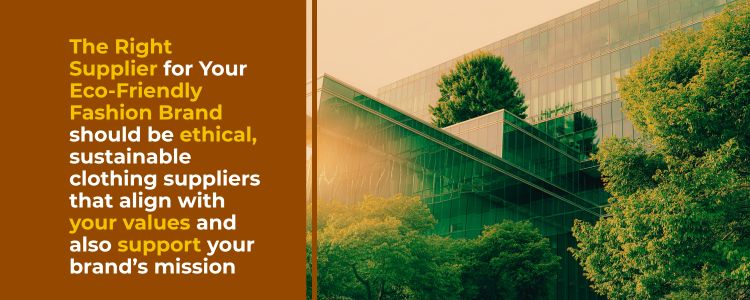How to Choose the Right Clothing Supplier for Your Eco-Friendly Brand
The global fashion industry has changed primarily as an outcome of the emergence of conscious purchasing. Customers nowadays desire transparency, environmental sustainability, and environmentally friendly manufacturing along with fashionable and affordable apparel. Sustainable apparel sourcing firms committed to reducing their effect on the environment and supporting fair employment standards came into existence as the outcome of these practices. Finding an ideal apparel provider is the most crucial stage in developing an eco-friendly brand.
According to the UN, the fashion sector is the world’s second-largest water consumer and generates 10% of all carbon emissions. If this will not be managed properly, each step of the apparel supply chain, starting with the production of textiles to shipping, can result in waste, pollution, and social injustice. Due to this, selecting an ethical clothing supplier that embraces the same ideals as your company is sensible and ethically required.
Through ethical labor regulations, low-impact production, and environmentally friendly resources, a reputable supplier could assist with fulfilling your ultimate goal. On the other hand, inappropriate collaboration could damage your reputation and drive off clients. In this blog, we’ll talk about essential variables to consider while selecting the best suppliers for eco-fashion brands and provide guidance regarding how to make your entire supply chain correspond to your objectives for environmental sustainability.
Determine Your Sustainability Objectives
Decide exactly what environmentally friendly means for your brand before you start searching for vendors. A clearly defined environmental sustainability evaluation helps to shortlist the range of suppliers that have to choose among. It also ensures that your decisions will not be impacted by confusing marketing concepts like “natural” or “green” without supporting evidence.
Are you focusing on
- Natural materials such as bamboo, hemp, or cotton?
- Considering material that has been recycled or refurbished?
- Zero- or low-waste manufacturing strategies?
- Carbon-neutral Transportation?

Look for Certifications
Third-party certifications are one of the best ways to verify supply chain transparency in the fashion industry. These certifications help reduce greenwashing and provide you and your customers with tangible proof of ethical practices.
Look for suppliers that have:
- GOTS (Global Organic Textile Standard) – Organic fibers and sustainable processing.
- OEKO-TEX® Standard 100 – Tests for harmful substances in textiles.
- Fair Trade Certified – Ensures ethical labor and fair wages.
- WRAP (Worldwide Responsible Accredited Production) – Promotes lawful, humane, and ethical manufacturing.
- Bluesign® – Certifies responsible chemical use in production.
Evaluate Material Sourcing and Production Methods
Consider the energy and water consumption of their facilities. Sustainable apparel sourcing suppliers often use low-impact dyes, closed-loop water systems, or solar-powered factories. Closed-loop manufacturing in the production of fabrics like TENCEL™ can reuse 99% of the solvent, making it significantly more eco-friendly than traditional fabric production.
Ask detailed questions about the supplier’s materials and processes.
- Where do they source raw materials?
- Are the materials renewable, biodegradable, or recycled?
- What dyes or chemicals are used in manufacturing?
- How is waste managed?
Assess Transparency and Traceability
Transparency ensures that your brand won’t be blindsided by labor violations or environmental scandals. Traceability also builds trust with eco-conscious consumers who often want to know exactly where and how their clothes were made. An ethical supplier should be fully transparent about their supply chain. Ask if they:
- Disclose factory locations.
- Allow site visits or third-party audits.
- Track every stage of production—from fiber to final product.
Request Samples and Evaluate Quality
Sustainability doesn’t mean compromising on quality. A sustainable garment that doesn’t last defeats its purpose. High-quality products reduce return rates, increase customer satisfaction, and reinforce your brand’s credibility. Request product samples to check:
- Stitching durability
- Fabric feel and finish
- Colorfastness
- Fit and sizing accuracy
Review Minimum Order Quantities and Flexibility
Many eco-friendly brands start small, so finding a supplier with reasonable MOQs is essential. Some large manufacturers require bulk orders, which can lead to overproduction, a problem you’re likely trying to avoid. A study says over 30% of clothing made each year is never sold, contributing to enormous textile waste globally. Look for a supplier willing to:
- Offer low MOQs or scalable production
- Work with you on design customization
- Collaborate on waste reduction initiatives
Check Their Environmental and Social Impact
A truly sustainable supplier should be able to share data or reports on:
- Carbon emissions
- Waste generation and recycling rates
- Energy and water consumption
- Labor practices and community initiatives
Consider Location and Shipping Impact
Transporting goods across the globe has a significant carbon footprint. Consider working with local or regional suppliers to minimize emissions and shipping costs. If international sourcing is necessary, opt for suppliers that offset carbon or use sustainable logistics providers.
- Domestic suppliers offer faster turnaround and easier communication.
- Nearshoring balances cost and sustainability.
Conclusion
Choosing the right clothing supplier for your eco-friendly fabric sourcing and production brand is one of the most important decisions you’ll make. It sets the foundation for your sustainability journey and determines whether your products truly reflect your brand’s values. Take the time to research, verify claims, and build relationships with suppliers who are as committed to the planet and people as you are.
Remember, sustainability is the future of fashion. Partnering with the right supplier means you’re not just making clothes; you’re making a difference. For businesses looking for sustainable apparel sourcing, Inductus Global stands out as the premier procurement partner from India. Their deep industry knowledge, transparent processes, and commitment to quality make them an invaluable asset for eco-friendly sourcing aiming to scale affordably and sustainably.









